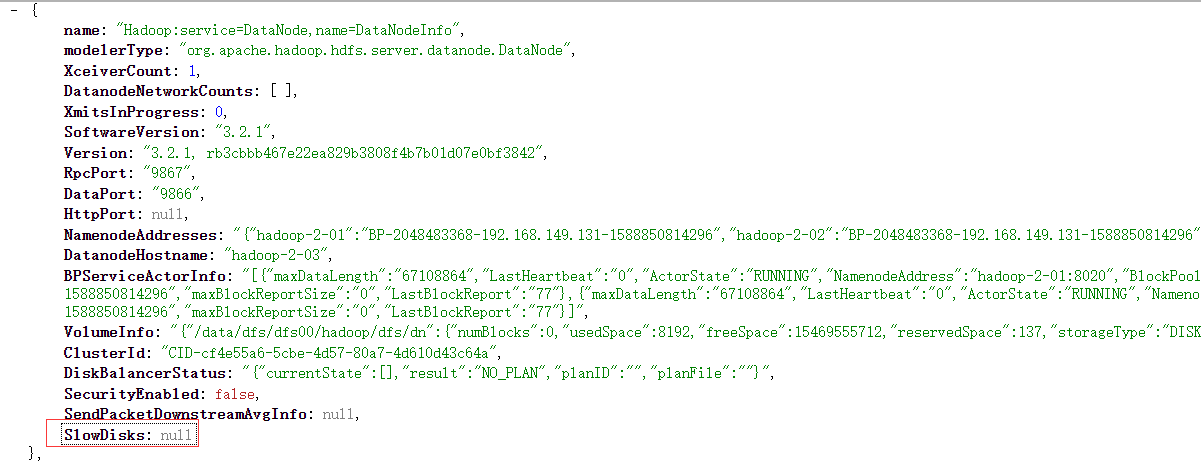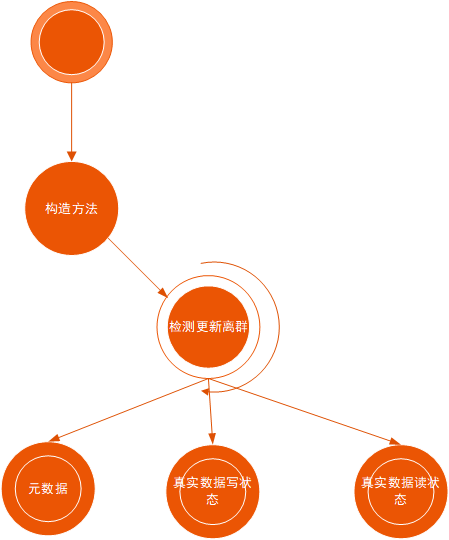前言
DataNodeDiskMetric是磁盘慢盘检测工具,可以把DataNode慢盘对外以接口的方式暴露,方面集群管理人员对磁盘的读写现状 有一个清晰的认识.本文我们简单分析一下慢盘检测的机制,其中包括离群值计算概念.
JMX接口暴露
- 访问http://datanode ip:9864/jmx 如下截图,可以看到慢盘检测后获取慢盘的数组

DataNodeDiskMetrics源代码
执行流程如下
- 构造方法中new OutliterDetector【离群检测】,启动检测线程
- 获取DataNode上磁盘的元数据操作,真实数据的读取写入上一次指标数据
- 每次线程轮询一次就更新一次离群值
构造方法源代码:
public DataNodeDiskMetrics(DataNode dn, long diskOutlierDetectionIntervalMs) {
//获取DataNode
this.dn = dn;
//线程运行的间隔
this.detectionInterval = diskOutlierDetectionIntervalMs;
//new 离群检测
slowDiskDetector = new OutlierDetector(MIN_OUTLIER_DETECTION_DISKS,
SLOW_DISK_LOW_THRESHOLD_MS);
//是否需要一直后台运行
shouldRun = true;
//启动线程
startDiskOutlierDetectionThread();
}
启动线程核心代码:
private void startDiskOutlierDetectionThread() {
slowDiskDetectionDaemon = new Daemon(new Runnable() {
@Override
public void run() {
while (shouldRun) {
if (dn.getFSDataset() != null) {
Map<String, Double> metadataOpStats = Maps.newHashMap();
Map<String, Double> readIoStats = Maps.newHashMap();
Map<String, Double> writeIoStats = Maps.newHashMap();
FsDatasetSpi.FsVolumeReferences fsVolumeReferences = null;
try {
//获取所有磁盘引用
fsVolumeReferences = dn.getFSDataset().getFsVolumeReferences();
Iterator<FsVolumeSpi> volumeIterator = fsVolumeReferences
.iterator();
while (volumeIterator.hasNext()) {
//获取所有的磁盘
FsVolumeSpi volume = volumeIterator.next();
//获取磁盘上的指标数据
DataNodeVolumeMetrics metrics = volume.getMetrics();
//获取磁盘的名字
String volumeName = volume.getBaseURI().getPath();
//元数据的指标数据
metadataOpStats.put(volumeName,
metrics.getMetadataOperationMean());
//实际数据read
readIoStats.put(volumeName, metrics.getReadIoMean());
//实际数据的write
writeIoStats.put(volumeName, metrics.getWriteIoMean());
}
} finally {
if (fsVolumeReferences != null) {
try {
fsVolumeReferences.close();
} catch (IOException e) {
LOG.error("Error in releasing FS Volume references", e);
}
}
}
if (metadataOpStats.isEmpty() && readIoStats.isEmpty()
&& writeIoStats.isEmpty()) {
LOG.debug("No disk stats available for detecting outliers.");
continue;
}
//更新离群值
detectAndUpdateDiskOutliers(metadataOpStats, readIoStats,
writeIoStats);
}
try {
Thread.sleep(detectionInterval);
} catch (InterruptedException e) {
LOG.error("Disk Outlier Detection thread interrupted", e);
Thread.currentThread().interrupt();
}
}
}
});
slowDiskDetectionDaemon.start();
}
大致工作流程如下:

OutlierDetector源代码
使用中位数的绝对差比较慢盘
public Map<String, Double> getOutliers(Map<String, Double> stats) {
if (stats.size() < minNumResources) {
return ImmutableMap.of();
}
// 计算平均绝对差
final List<Double> sorted = new ArrayList<>(stats.values());
Collections.sort(sorted);
//获取中位数
final Double median = computeMedian(sorted);
//计算平均绝对差
final Double mad = computeMad(sorted);
Double upperLimitLatency = Math.max(
lowThresholdMs, median * MEDIAN_MULTIPLIER);
upperLimitLatency = Math.max(
upperLimitLatency, median + (DEVIATION_MULTIPLIER * mad));
final Map<String, Double> slowResources = new HashMap<>();
// 更新慢磁盘
for (Map.Entry<String, Double> entry : stats.entrySet()) {
if (entry.getValue() > upperLimitLatency) {
slowResources.put(entry.getKey(), entry.getValue());
}
}
return slowResources;
}
总结
以上为笔者对DataNodeDiskMetrics的概述,希望本文对读者起到一定的帮助.
参考
- https://issues.apache.org/jira/browse/HDFS-11461
- https://issues.apache.org/jira/browse/HDFS-14235





